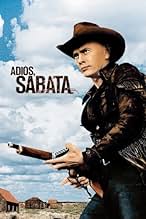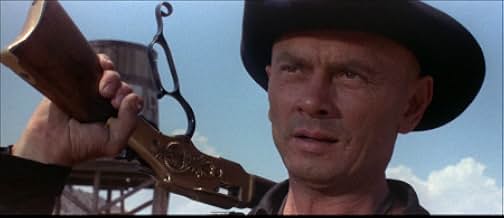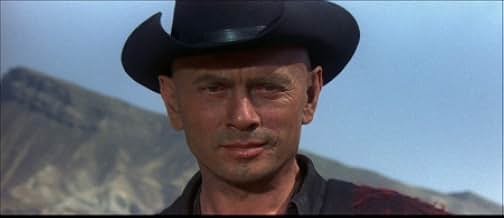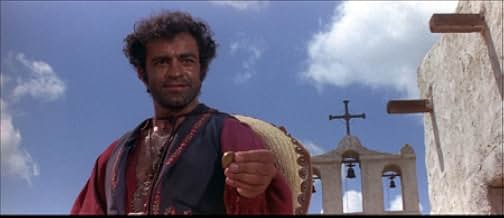Sabata Adeus
Título original: Indio Black, sai che ti dico: Sei un gran figlio di...
AVALIAÇÃO DA IMDb
5,9/10
2,5 mil
SUA AVALIAÇÃO
Adicionar um enredo no seu idiomaSabata helps a band of Mexican revolutionaries steal a wagon-load of gold from the occupying Austrian forces of Emperor Maximilian I.Sabata helps a band of Mexican revolutionaries steal a wagon-load of gold from the occupying Austrian forces of Emperor Maximilian I.Sabata helps a band of Mexican revolutionaries steal a wagon-load of gold from the occupying Austrian forces of Emperor Maximilian I.
- Direção
- Roteiristas
- Artistas
Ignazio Spalla
- Escudo
- (as Pedro Sanchez)
Gérard Herter
- Colonel Skimmel
- (as Gerard Herter)
Turam Quibo
- Gitano
- (as Joseph Persaud)
Nieves Navarro
- Kingsville Saloon Dancer
- (as Susan Scott)
Vittorio Caronia
- 1st Lt. Steiner
- (as Vitti Caronia)
Avaliações em destaque
In his one and only venture into the pasta western, Yul Brynner finds himself succeeding Lee Van Cleef as the mysterious gunfighter Sabata who gets himself involved in Mexican politics in trying to overthrow the Emperor Maximilian. There hasn't been a film yet where the Juaristas aren't the good guys, even in Juarez where Brian Aherne made a sympathetic if somewhat naive Maximilian. It's such a clear case of imperialism.
But Yul isn't a total good guy and he teams up with three partners to steal a shipment of gold from the occupiers and give it to the Juaristas ostensibly. Actually the four of them are only as good as they have to be. And they've got another along, an American played by the only American actor in Adios Sabata, Dean Reed, who has an agenda all his own who keeps a positively explosive diary.
As most of us know even those who get their history from films, the Emperor Maximilian was an Austrian, but who was put on the newly created Mexican throne by the French and sustained by the French army. But here we have Austrian occupiers including an Austrian commander who also has a private agenda. I'm betting the producers were thinking that German types make so much better villains than the French.
Sabata's distinguishing characteristic was a rife that he had a long holster for and drew like a revolver. This rife had a unique horizontal magazine from where the bullets came. But the last chamber always had a cigar which Yul would light up after a killing well done.
I'm not a fan of spaghetti westerns and don't usually give them good reviews. It's the American genre and should be done by Americans. This one is no exception. But I will say that Yul Brynner's cynical look throughout the film is quite priceless.
But Yul isn't a total good guy and he teams up with three partners to steal a shipment of gold from the occupiers and give it to the Juaristas ostensibly. Actually the four of them are only as good as they have to be. And they've got another along, an American played by the only American actor in Adios Sabata, Dean Reed, who has an agenda all his own who keeps a positively explosive diary.
As most of us know even those who get their history from films, the Emperor Maximilian was an Austrian, but who was put on the newly created Mexican throne by the French and sustained by the French army. But here we have Austrian occupiers including an Austrian commander who also has a private agenda. I'm betting the producers were thinking that German types make so much better villains than the French.
Sabata's distinguishing characteristic was a rife that he had a long holster for and drew like a revolver. This rife had a unique horizontal magazine from where the bullets came. But the last chamber always had a cigar which Yul would light up after a killing well done.
I'm not a fan of spaghetti westerns and don't usually give them good reviews. It's the American genre and should be done by Americans. This one is no exception. But I will say that Yul Brynner's cynical look throughout the film is quite priceless.
Ok so it was supposed to be called INDIO BLACK as well as it should have been.
After all, Yul Brynner played the character far differently than Lee Van Cleef did and this film really shouldn't be associated with the other two Sabata films. It's a different character look altogether with the Brynner version dressed in black buckskin and silver buckles while the Van Cleef version of Sabata settled more for the conservative Bret Maverick gambler look.
Also notably stars failed American singer Dean Reed who would later die under mysterious circumstances in East Germany during the 1980s.
The Bruno Nicolai score is excellent although derivative of other scores for the genre. If you like soundtracks for these types of films, then it's well worth picking up. I know I'll be on the lookout for it.
Lots of explosions and gunfire in this one as Brynner & Co. battle the Austrians under Maximillian (in Mexico circa 1867) and steal their gold. There's nothing boring about it and it's face-paced with a few tricks such as the model of the ship in Colonel Skimmel's study that shoots real live ammo everytime someone opens the drawer below it. I also like Brynner's sawed-off rifle with the clip that loads from the side. He keeps a cigar in the last chamber and lights it up after every gun battle. Very tongue-in-cheek.
I liked it. Too bad the widescreen version was cropped for television.
6 out of 10
After all, Yul Brynner played the character far differently than Lee Van Cleef did and this film really shouldn't be associated with the other two Sabata films. It's a different character look altogether with the Brynner version dressed in black buckskin and silver buckles while the Van Cleef version of Sabata settled more for the conservative Bret Maverick gambler look.
Also notably stars failed American singer Dean Reed who would later die under mysterious circumstances in East Germany during the 1980s.
The Bruno Nicolai score is excellent although derivative of other scores for the genre. If you like soundtracks for these types of films, then it's well worth picking up. I know I'll be on the lookout for it.
Lots of explosions and gunfire in this one as Brynner & Co. battle the Austrians under Maximillian (in Mexico circa 1867) and steal their gold. There's nothing boring about it and it's face-paced with a few tricks such as the model of the ship in Colonel Skimmel's study that shoots real live ammo everytime someone opens the drawer below it. I also like Brynner's sawed-off rifle with the clip that loads from the side. He keeps a cigar in the last chamber and lights it up after every gun battle. Very tongue-in-cheek.
I liked it. Too bad the widescreen version was cropped for television.
6 out of 10
Firstly, this is *not* a sequel to 1970's "Sabata" ("Ehi amico... c'è Sabata, hai chiuso!") although it can be considered a follow up of sorts. Lee Van Cleef did not reprise the role until 1971's "Return of Sabata". "Adiós Sabata" was originally about a character called Indio Black and completely unrelated to the previous Sabata story - Indio, I believe, was meant to be nothing more than a bandit. The name was changed to cash in on the success of "Sabata" - though this film could be considered a true Sabata entry as a couple of stars return (Pedro Sanchez, Gianni Rizzo) and the screenwriters and director are the same. Gianfranco Parolini (Frank Kramer) perhaps out does the previous film here, keeping everything tighter - "Sabata" was a little too jokey (although still excellent and one of the truly great Italian westerns) whereas this is blatantly tongue in cheek. I feel the music is better in this film, never intrusive and always fitting: a triumph for Bruno Nicolai, despite the fact that it is incredibly reminiscent of Morricone.
As Sabata, Brynner is a kind of anti-hero counterpart to Chris from "The Magnificent Seven"; he even dresses out all in black here too. Gérard Herter is great as the Austrian Colonel Skimmel at the time of Emperor Maximillian's Mexico - a kind of borderline camp, Bond villain type, complete with monacle and perfectly trimmed moustache. Oh, and yes, he is a dead shot with a rifle. In "Sabata", Franco Ressel's Stengel had his shootout's behind man shaped shields (to live at the peak of danger or some such nonsense) as his playtoy; Herter's Skimmel has an even better one - a drawer beneath a model ship that when opened fires each cannon on the model directly into whoever opens the drawer. Like "The Good, the Bad and the Ugly" (which this film contains some surprisingly subtle references to) the plot centres around a shipment of gold: Sabata, Escudo (Sanchez) and Ballantine (Dean Reed) want the wagon load of gold, but it is also coveted by Maximillian's rebels. The scenes with the gold and the gold dust being poured out/spilled is nicely complimented by Nicolai's incidental music which really does bring out the joy of the characters.
I personally think it's a shame that Brynner and the others weren't brought back for another Sabata film because he plays the role much straighter than Van Cleef did and really does come across as a tough guy here, who doesn't need to rely on his gun. "Adiós Sabata" is a classic in it's own right and doesn't need to be viewed with the other Sabata entries. It's only downside is that after surpassing the superb original, it left most people disappointed with the later "Return of Sabata".
Are these subtle hints to Leone's 1966 masterpiece? Sanchez: "Me, I'd make a hiding place no-one would find - stick it in the ground, maybe in a cemetery..." Reed (the last line): "Hey fellas - are you gonna help me pick up the gold or not, you sons of...!" (music takes over)
As Sabata, Brynner is a kind of anti-hero counterpart to Chris from "The Magnificent Seven"; he even dresses out all in black here too. Gérard Herter is great as the Austrian Colonel Skimmel at the time of Emperor Maximillian's Mexico - a kind of borderline camp, Bond villain type, complete with monacle and perfectly trimmed moustache. Oh, and yes, he is a dead shot with a rifle. In "Sabata", Franco Ressel's Stengel had his shootout's behind man shaped shields (to live at the peak of danger or some such nonsense) as his playtoy; Herter's Skimmel has an even better one - a drawer beneath a model ship that when opened fires each cannon on the model directly into whoever opens the drawer. Like "The Good, the Bad and the Ugly" (which this film contains some surprisingly subtle references to) the plot centres around a shipment of gold: Sabata, Escudo (Sanchez) and Ballantine (Dean Reed) want the wagon load of gold, but it is also coveted by Maximillian's rebels. The scenes with the gold and the gold dust being poured out/spilled is nicely complimented by Nicolai's incidental music which really does bring out the joy of the characters.
I personally think it's a shame that Brynner and the others weren't brought back for another Sabata film because he plays the role much straighter than Van Cleef did and really does come across as a tough guy here, who doesn't need to rely on his gun. "Adiós Sabata" is a classic in it's own right and doesn't need to be viewed with the other Sabata entries. It's only downside is that after surpassing the superb original, it left most people disappointed with the later "Return of Sabata".
Are these subtle hints to Leone's 1966 masterpiece? Sanchez: "Me, I'd make a hiding place no-one would find - stick it in the ground, maybe in a cemetery..." Reed (the last line): "Hey fellas - are you gonna help me pick up the gold or not, you sons of...!" (music takes over)
This is not the same "Sabata" character as in the Lee Van Cleef movies. This character was actually supposed to be named "Indio Black" but they changed his name for the English version. Why they thought that a western with a big star like Yul Brynner wouldn't be popular enough on it's own, and tried to cash in on the Sabata name is beyond me, but studios and distributors did a lot of stupid things to film titles back then, especially with the international releases, so it's par for the course.
Yul Brynner is interesting as the protagonist in this film. Too bad he didn't appear in any other spaghetti westerns. He's no Lee Van Cleef, but he does have a style of his own. His accent makes him sound like Arnold Schwartzeneggar in some parts. Gerard Herter is great as the wicked, Nazi-like Austrian Colonel. I wasn't very impressed with any of the other actors in the movie. Dean Reed was especially awful, and his character, "Ballantyne" was very irritating. I kept hoping he would get killed throughout the whole movie, but that damned Indio Black kept saving him.
The music score is OK, but not as good as most of Bruno Nicolai's other work, and there are very long stretches of the film with no music at all where it probably could use some.
The movie drags a little from the middle to the end. There's lots of action, but it just doesn't have the pizazz or suspense of the really great spaghetti westerns. It would probably be better if it was shorter. Some movies, like Sergio Leone's westerns for example, are able to go on for 2 or 3 hours and not have a dull moment, but this movie isn't one of them. It could have been 15 or 20 minutes shorter.
Overall, the production quality is good, and the story is OK, though it's nothing original. This one is worth watching, but probably for spaghetti western fans only.
Yul Brynner is interesting as the protagonist in this film. Too bad he didn't appear in any other spaghetti westerns. He's no Lee Van Cleef, but he does have a style of his own. His accent makes him sound like Arnold Schwartzeneggar in some parts. Gerard Herter is great as the wicked, Nazi-like Austrian Colonel. I wasn't very impressed with any of the other actors in the movie. Dean Reed was especially awful, and his character, "Ballantyne" was very irritating. I kept hoping he would get killed throughout the whole movie, but that damned Indio Black kept saving him.
The music score is OK, but not as good as most of Bruno Nicolai's other work, and there are very long stretches of the film with no music at all where it probably could use some.
The movie drags a little from the middle to the end. There's lots of action, but it just doesn't have the pizazz or suspense of the really great spaghetti westerns. It would probably be better if it was shorter. Some movies, like Sergio Leone's westerns for example, are able to go on for 2 or 3 hours and not have a dull moment, but this movie isn't one of them. It could have been 15 or 20 minutes shorter.
Overall, the production quality is good, and the story is OK, though it's nothing original. This one is worth watching, but probably for spaghetti western fans only.
Sort of sequel to the earlier Sabata with Lee Van Cleef, this was filmed as Indio Black and is known as that in several countries. The title was changed when the distributor paid for the right to use the name Sabata from the original films producer. The result is Sabata becomes a dead ringer for Chris, Yul Brynner's character from the Magnificent Seven films (a character Van Cleef was playing in a movie shot at the same time as this).
Aren't the back stage maneuvering of Spaghetti Westerns fun? Some times the stories are more fun than the movies.Fortunately this movie is more fun than the story.
The plot has Sabata (Yul Brenner) helping Mexican revolutionaries attempting to over throw the Emperor Maximilian. Sabata is to steal some gold and then use it to buy guns to attack an evil General. However things don't go as planned and when they go to steal the gold someone else is already there. Add to the whole mix spies, greed and some odd left turns and you get one entertaining, but not very coherent movie.
Don't get me wrong I like this movie a great deal, I just wish it made some sense. Characters appear out of left field when it suits the plot, people don't do anything logical (I mean if you just stole a wagon full of gold you'd make sure that the gold was really there wouldn't you?), after a certain point its never clear if they are keeping the gold or giving it to the revolution. Its enough to drive you crazy if you let it. I didn't since a good many of the spaghetti westerns I've seen make even less sense then this one.
If you like Westerns this is one to see. Its perfect for a rainy Sunday afternoon. I'm still not sure if I think of Brenner's character as Sabata, but it doesn't matter since no matter what he's called he's a kick ass hero with a smart ass mouth. What more could you want?
Aren't the back stage maneuvering of Spaghetti Westerns fun? Some times the stories are more fun than the movies.Fortunately this movie is more fun than the story.
The plot has Sabata (Yul Brenner) helping Mexican revolutionaries attempting to over throw the Emperor Maximilian. Sabata is to steal some gold and then use it to buy guns to attack an evil General. However things don't go as planned and when they go to steal the gold someone else is already there. Add to the whole mix spies, greed and some odd left turns and you get one entertaining, but not very coherent movie.
Don't get me wrong I like this movie a great deal, I just wish it made some sense. Characters appear out of left field when it suits the plot, people don't do anything logical (I mean if you just stole a wagon full of gold you'd make sure that the gold was really there wouldn't you?), after a certain point its never clear if they are keeping the gold or giving it to the revolution. Its enough to drive you crazy if you let it. I didn't since a good many of the spaghetti westerns I've seen make even less sense then this one.
If you like Westerns this is one to see. Its perfect for a rainy Sunday afternoon. I'm still not sure if I think of Brenner's character as Sabata, but it doesn't matter since no matter what he's called he's a kick ass hero with a smart ass mouth. What more could you want?
Você sabia?
- CuriosidadesThis was not originally a Sabata film. The original Italian title translates as "Indio Black, you know what? You're a big son of a...", Indio Black being the character played by Yul Brynner, but the title and Brynner's character name were changed for the American release to cash in on Sabata, o Homem que Veio para Matar (1969), the original Sabata film. Lee Van Cleef was asked to star in this film, but rejected the offer for some reason. He was then replaced by Brynner, whose character would only be called Sabata in the international English language version, and Indio Black in the Italian version. However, lip reading viewers have noticed that the actors who mouth their lines in English, seem to say "Sabata", not "Indio", so the re-baptism took place while the film was still being shot.
- Erros de gravaçãoWhen Sabata invades Colonel Skimmel's quarters, he sees the reflection of a person hiding behind the door. The person in the reflection is not Hertz.
- ConexõesEdited into Spaghetti Western Trailer Show (2007)
Principais escolhas
Faça login para avaliar e ver a lista de recomendações personalizadas
- How long is Adiós, Sabata?Fornecido pela Alexa
Detalhes
Bilheteria
- Faturamento bruto nos EUA e Canadá
- US$ 546.926
- Tempo de duração
- 1 h 44 min(104 min)
- Proporção
- 2.35 : 1
Contribua para esta página
Sugerir uma alteração ou adicionar conteúdo ausente





























